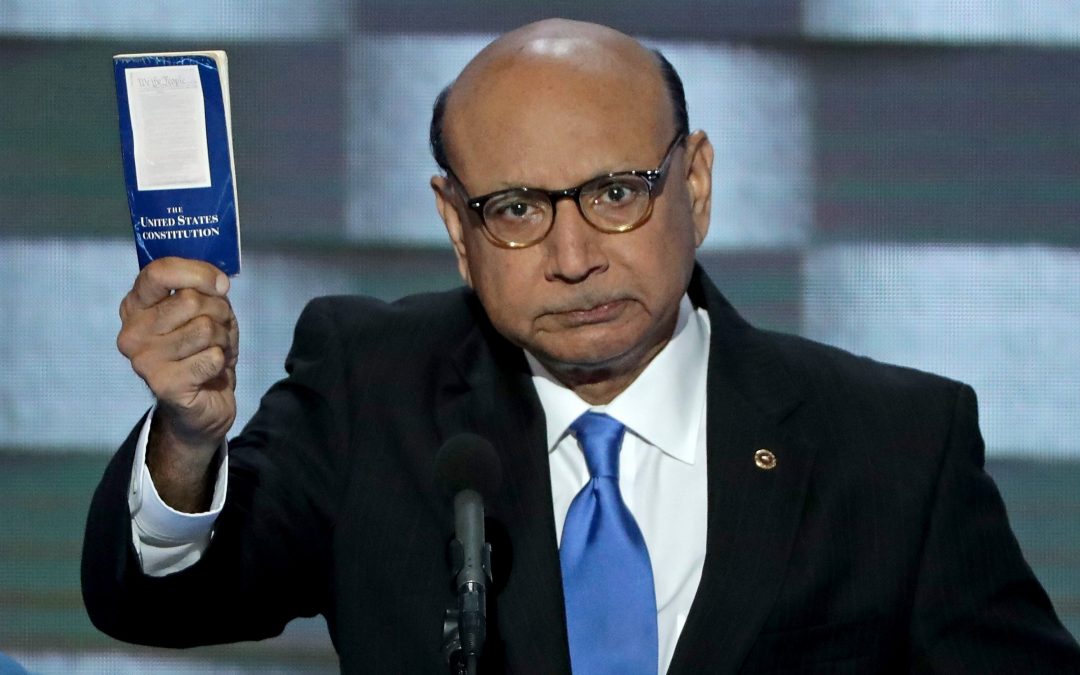It was an afterthought; a 99-cent pocket Constitution that Khizr Khan bought in bulk, so he could give one to each of the Army ROTC cadets from the University of Virginia who came to his home to honor his son, a former cadet like them who was killed in Iraq in 2004.
“Each of you will be taking an oath soon to defend this Constitution,” Khan told the cadets. “Please read it as you prepare to defend it … regardless of the cost.”
That little book would become so much more for Khan after he pulled it from his jacket at the 2016 Democratic National Convention, held it up and addressed then-Republican presidential candidate Donald Trump, who had spoken out against immigrants and Muslims.
“Have you even read the United States Constitution?” Khan famously asked, as his wife, Ghazala, stood stoically beside him. “I will gladly lend you my copy.”
That copy is now so iconic that “it has been retired,” Khan said, and donated — by request — to the Virginia Historical Society.
Now Khan is traveling the country with a book of his own, “An American Family,” which tells how his life led him from Pakistan to the stage of the DNC, to cities all over the country, where he speaks about immigration, being a Muslim American, a Gold Star father and a patriot.
Khan will speak and sign copies of his book on Friday, Dec. 8, at 7 p.m. at Seattle University’s Campion Ballroom. The event is free.
“The book is not our story; it’s the story of every immigrant,” Khan said the other day.
Khan first came into the public eye when he was interviewed by a reporter about then-candidate Trump’s suggestion that Muslims be banned from entering the United States. The story caught the attention of Hillary Clinton’s campaign, which asked the Khans to speak at the convention as Muslim immigrants and Gold Star parents. Their middle son, U.S. Army Capt. Humayun Khan, was killed by a suicide bomber while stationed in Iraq in 2004.
At first, Khan and his wife didn’t want to enter the political fray. But then Khan attended a birthday party with his grandchildren and heard from parents whose children were afraid of being thrown out of the country.
“We were torn,” Khan said. “We knew we should stand up for our son, and these children, but our peace and safety was a concern.”
After receiving a letter from four middle-school children, Khan knew he had to speak.
The couple live in Charlottesville, Virginia, and they were home Aug. 12 and 13, when white nationalists held a “Unite the Right” rally there, opposing the removal of a statue of Robert E. Lee. Protesters clashed with counterprotesters, and one woman was killed and 19 were injured when a man rammed his car into the crowd. The Khans were advised by friends and family to stay home.
But on the 15th, they joined children and families who walked the same path as the protesters.
“We wanted to show our children that that was not America at all,” Khan said. “That display of hate and division was not America at all. They could see what the real America looks like. And that display gave me hope.”
Khan pulls optimism from everywhere, starting with his own story: Born in Pakistan, he made his way to Harvard Law School and the U.S. national stage. He fathered three sons and lives in a country where he can say what he thinks and feels, despite the sadness and frustration he feels over what comes out of Washington, D.C.
He said he draws strength from other events: the 40,000 Bostonians who showed up to protest a white nationalist “free speech” rally. The female Democratic candidates who ousted male, Republican candidates in Virginia — including Danica Roem, the first transgender person to be elected to a state legislature.
“People are realizing that remaining quiet and worried is not the solution,” Khan said. “And I remember what people have said to me, how affectionate people have been, how concerned people in Toledo and Des Moines have been. And that come November, we will defend our democracy.
“That gives me hope that this nonsense cannot continue for too long.”
At a reading the other night, someone asked him if he could propose any amendment to the U.S. Constitution, what it would be.
Khan had that one in his pocket: “Make it mandatory for every American to read the Declaration of Independence. The Bill of Rights and the Articles of Confederation.”
And he offered his favorite quote, from Rumi: “So what if you are thirsty? Always be a river for everyone.”
“It means, ‘So what if I am worried? I must share my enthusiasms so that we all become hopeful and so that hope will prevail and unity will prevail.’
“I am optimistic,” he said, “that this is a good nation.”
Nicole Brodeur’s column appears Tuesday and Sunday. Reach her at 206-464-2334 or [email protected]. ___
(c)2017 The Seattle Times
Visit The Seattle Times at www.seattletimes.com
Distributed by Tribune Content Agency, LLC.
This article is written by Nicole Brodeur from Seattle Times and was legally licensed via the Tribune Content Agency through the NewsCred publisher network. Please direct all licensing questions to [email protected].
© Copyright 2018 Seattle Times. All rights reserved. This material may not be published, broadcast, rewritten or redistributed.

